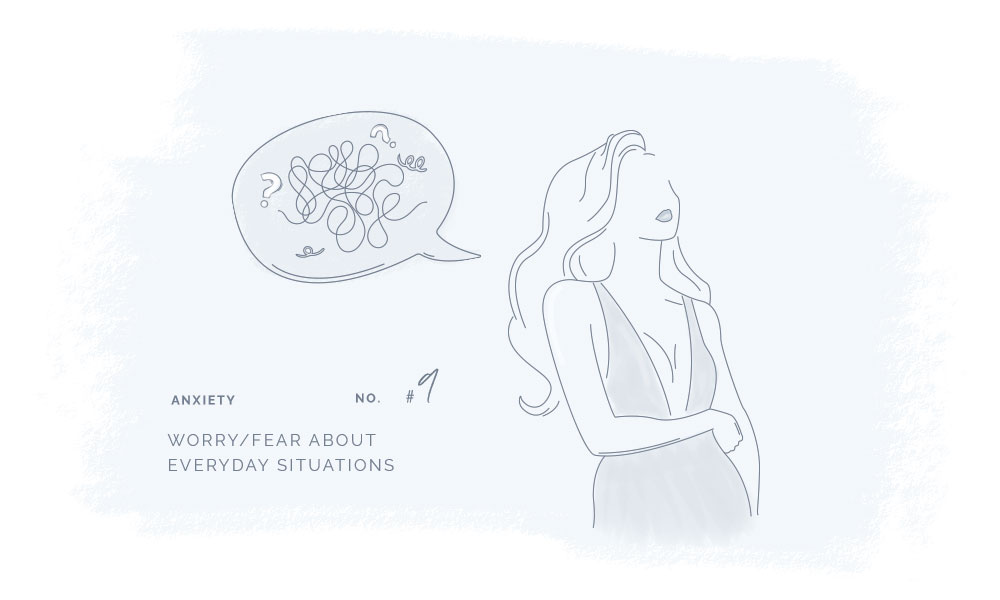Anxiety
Category
Behavioral, Neurodevelopmental,
Psychiatric
REVIEWED BY
Our Biomedical Scientist
Reviewed based on
Literature Discussion & Clinical Trials
Last update
December 2020

What is Anxiety
Anxiety is a group of mental disorders that leads to persistent, intense, and excessive worry or fear about everyday situations. Anxiety can interfere with most aspects of a patient’s life.
In addition, anxiety is often accompanied by a range of physical symptoms such as trembling, muscular tensions, dizziness, and palpitations.1
Symptoms may include
- Restlessness, nervousness, and feeling tense
- Hyperventilation
- Sweating
- Trouble sleeping
- Avoiding triggers of anxiety
Cause
Up to this date, the cause of anxiety is not yet fully understood. However, several risk factors such as underlying health issues (both mental and physical), trauma, stress, certain personality types, drugs or alcohol, and genetics may play a role in the development of anxiety.1
The connection between Cannabinoids & Anxiety
Studies find that CBD and THC may have great therapeutic potential and may be used to help treat Anxiety. CBD and THC are well-known cannabinoids, however, they do not have the same psychoactive effects. THC is psychoactive while CBD does not possess psychoactive effects. According to WHO guidelines, the cannabidiol CBD is generally well tolerated with a good safety profile.
Evidence from preclinical studies has indicated that CBD and anandamide exert anxiolytic activities and control linked to fear.2
The role of cannabinoids in anxiety is ambiguous. THC can either elicit or inhibit anxiety, whereas CBD has anxiolytic properties and thus can help counteract potential anxiogenic of THC.3
The literature discussion is an overview of the published results from scientific studies investigating if and how cannabinoids can be beneficial in the treatment of Anxiety. The overview will be updated regularly to ensure the newest and most accurate information.
Cannabinoid receptor GPR55 involvement in stress reduction
Shi et al., found that mice exposed to chronic restraint stress had downregulated levels of GPR55, and its activation decreased anxiety-like behaviors, including also PLC-PKC and RhoA-ROCK pathways.4
Low levels of MAGL may be involved in increased anxiety response
As discussed by Chen et al., Kohnz et al., Mulvihill et al., cancer, neurodegenerative diseases, ischemic injuries, inflammation, pain, anxiety, nausea, and drug-withdrawal symptoms can possibly be treated by MAGL inhibitors, which showed potential therapeutic action.5,6,7
In an article by Jenniches et al., it was demonstrated that knockout mice lacking MAGL had reduced brain 2-AG levels (1/5`th of normal), reduction of AEA, and enhanced fear and anxiety responses.8
CBD exhibits anxiolytic activities
In a study by Almeida et al., with spontaneously hypertensive rats it was shown that CBD exhibits anxiolytic but not antipsychotic activities.9
Clinical trials are research studies that examine new treatments and evaluate their effects on human health outcomes.
CBD appear to reduce anxiety symptoms while THC increase anxiety symptoms
In a study by Martin-Santos et al., with healthy volunteers, administration of THC, but not CBD was shown to be connected to anxiety, dysphoria, and psychotic symptoms.10
In a trial by Bergamaschi et al., anxiety, cognitive impairment, and discomfort in speech performance were reduced by 600 mg of oral CBD.11
In a study by Das et al.12, CBD was also shown to help increase the extinction of fear memories.
Similarly, Rabinak et al.13, discussed that THC can help increase fear extinction in humans).
Limbic regions of the brain and 5-HT1A linked to anxiolytic effects of CBD
In a study by Crippa et al.14, increased activity in the limbic regions of the brain which play a role in emotional processing was shown to be connected to the anxiolytic effects of CBD.
In a study by Russo et al., the 5-HT1A receptor may be involved in mediating the anxiolytic action of CBD.15
- https://www.mayoclinic.org/diseases-conditions/anxiety/symptoms-causes/syc-20350961
- Papagianni, E.P., Stevenson, C.W., (2019) “Cannabinoid Regulation of Fear and Anxiety: an Update”. https://www.ncbi.nlm.nih.gov/pmc/articles/PMC6486906/pdf/11920_2019_Article_1026.pdf
- https://ghmedical.com/endocannabinoid-system/diseases/anxiety
- Shi et al., (2017) The novel cannabinoid receptor GPR55 mediates anxiolytic-like effects in the medial orbital cortex of mice with acute stress. MolecularBrain, 10(1), 38. https://doi.org/10.1186/s13041-017-0318-7
- Chen et al., (2012). Monoacylglycerol lipase is a therapeutic target for Alzheimer’s Cell Reports, 2(5), 1329-1339. https://doi.org/10.1016/j.celrep.2012.09.030
- Kohnz & Nomura, (2014). “Chemical Approaches to Therapeutically Target the Metabolism and Signaling of the endocannabinoid 2-AG and Eicosanoids. Chemical Society reviews, 43(19), 6859-6869. https://doi.org/10.1039/c4cs00047a
- Jenniches et al., (2016). “Anxiety, Stress, and Fear Response in Mice With Reduced endocannabinoid Levels. Biological Psychiatry, 79(10), 858-868. https://doi.org/10.1016/j.biopsych.2015.03.033
- Almeida et al., (2013). “ Cannabidiol exhibits anxiolytic but not antipsychotic property evaluated in the social interaction test. Neuropsychopharmacol. Biol. Psychiatry 41, 30–35. https://www.sciencedirect.com/science/article/pii/S0278584612002801?via%3Dihub
- Martin-Santos et al., (2012). ” Acute effects of a single, oral dose of d9-tetrahydrocannabinol (THC) and cannabidiol (CBD) administration in healthy volunteers. Curr. Pharm. Des. 18, 4966–4979.” https://pubmed.ncbi.nlm.nih.gov/22716148/
- Bergamaschi et al., (2011). ” Cannabidiol reduces the anxietyinduced by simulated public speaking in treatment-naïve social phobia patients. Neuropsychopharmacol. Off. Publ. Am. Coll. Neuropsychopharmacol. 36, 1219–1226.” https://pubmed.ncbi.nlm.nih.gov/21307846/
- Das, R.K., Kamboj, S.K., Ramadas, M., Yogan, K., Gupta, V., Redman, E., Curran, H.V., and Morgan, C.J.A. (2013). Cannabidiol enhances consolidation of explicit fear extinction in humans. Psychopharmacology (Berl.) 226, 781– https://link.springer.com/article/10.1007/s00213-012-2955-y
- Rabinak et al., (2013). ” cannabinoid facilitation of fear extinction memory recall in humans. Neuropharmacology 64, 396–402. https://pubmed.ncbi.nlm.nih.gov/22796109/
- Crippa et al., (2004). ” Effects of cannabidiol (CBD) on regional cerebral blood flow. Neuropsychopharmacol. Off. Publ. Am. Coll. Neuropsychopharmacol. 29, 417–426.” https://pubmed.ncbi.nlm.nih.gov/14583744/
- Russo et al., (2005). ” Agonistic properties of cannabidiol at 5-HT1A receptors. Neurochem. Res. 30, 1037–1043.” https://pubmed.ncbi.nlm.nih.gov/16258853/
CANNABINOIDS & RECEPTORS
Below you find the plant cannabinoids, cannabinoid receptors, and endocannabinoids that are associated with the potential therapy.
If you have any further information relevant to the connection between Anxiety and cannabinoids or find any of the information inaccurate, outdated or incomplete please contact us here.

